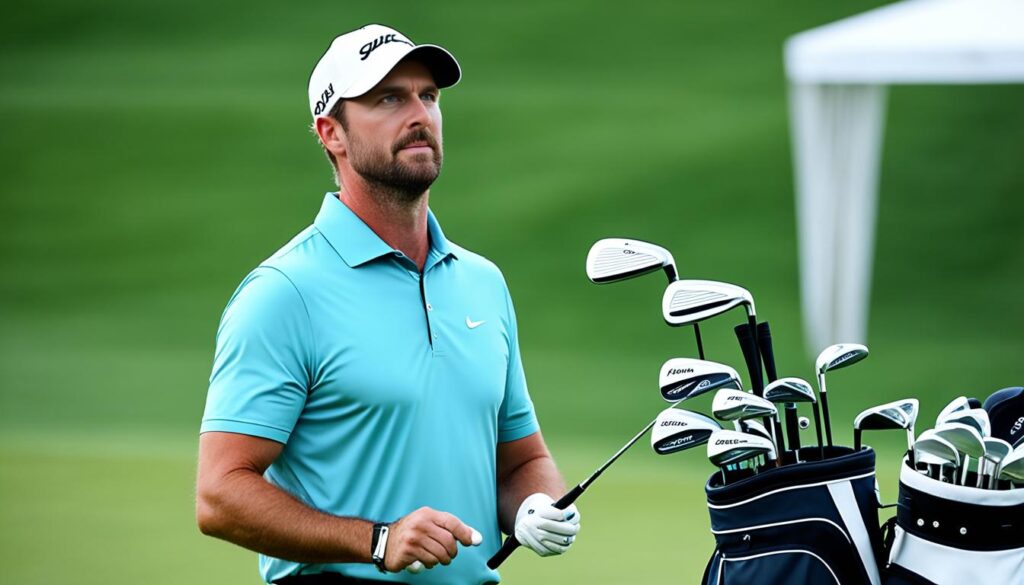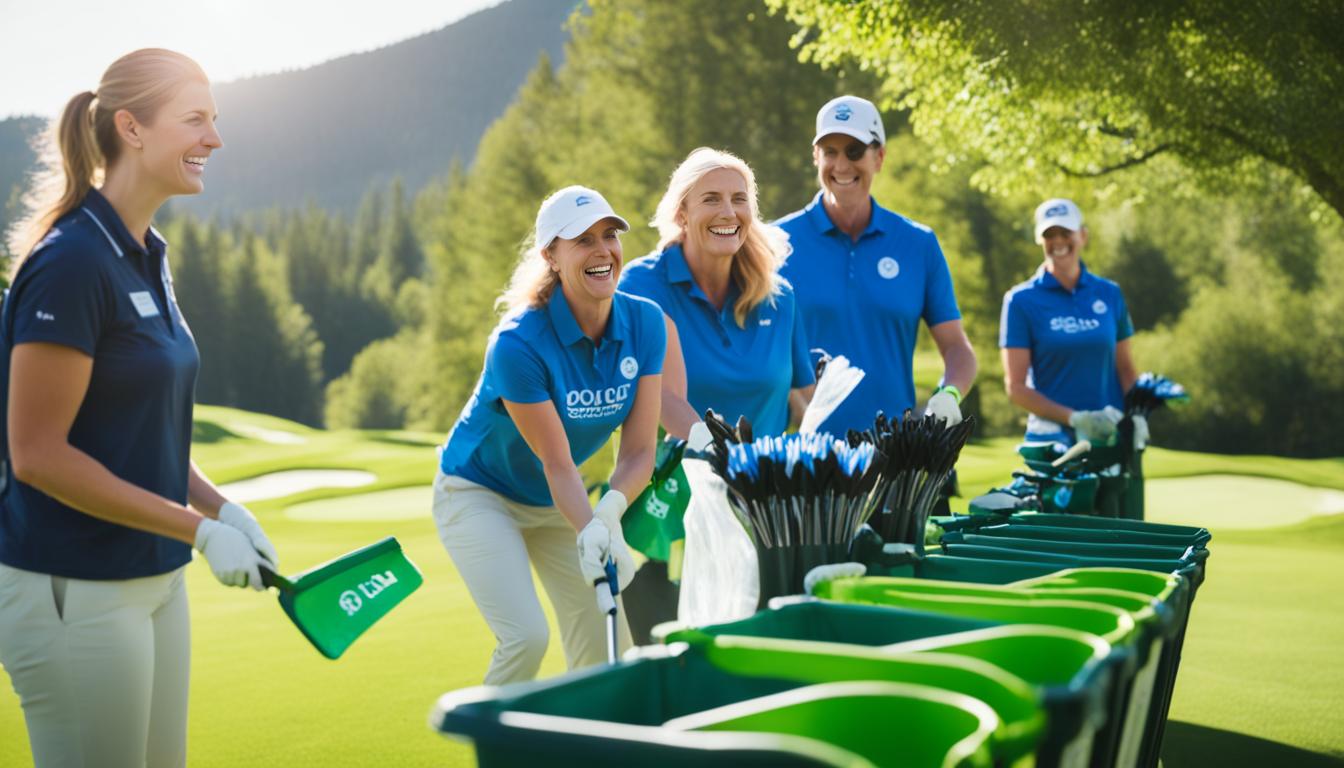When it comes to professional golf tournaments, there is a team behind every successful golfer. And at the heart of this team stands the golf caddy. Golf caddies are not just bag carriers; they are the unsung heroes who provide invaluable assistance and support to their players throughout the tournament.
The duties of a golf caddy go far beyond carrying a golfer’s bag. They are the trusted advisors who help golfers navigate the course, select the right clubs, and make strategic decisions. These caddies have an intricate understanding of golf tournament strategy and are masters of course navigation.
The caddy-player relationship is built on trust and camaraderie. Top golf caddies, like those on the PGA Tour, develop a deep understanding of their golfer’s game, preferences, and mindset. They provide not only physical support but also emotional guidance, reading their golfer’s body language and offering reassurance when needed.
The historical evolution of golf caddies showcases their significance in the game. From ancient times, where they served as companions and entertainers, to the present day, where they have become indispensable strategists, caddies have played an essential role in the success of professional golfers.
Key Takeaways:
- Golf caddies play a crucial role in golf tournaments, providing assistance and support to professional golfers.
- They are responsible for club selection, course navigation, advice on tricky shots, and emotional support.
- The caddy-golfer relationship is built on trust and camaraderie.
- Caddies have evolved from being companions and entertainers to becoming advisors and strategists.
- The historical evolution of caddies showcases their significance in the game.
The Historical Evolution of Golf Caddies
The role of caddies in golf has a fascinating historical evolution that spans centuries. In ancient times, caddies were more than just bag carriers; they served as companions and entertainers for golfers. These early caddies provided not only assistance on the course but also added entertainment value to the game, making it an enjoyable experience for the golfers.
As golf evolved and became a more formalized sport, caddies began to take on a structured role. They became experts in the game, learning the strategies and tactics required to excel on the course. Caddies were instrumental in providing golfers with valuable strategic advice, helping them navigate through the challenges and obstacles of the game.
The development of caddie responsibilities continued as professional golf tournaments started to gain popularity. With the rise of competitive golf, caddies became even more crucial in preparing golfers for tournaments. They took on the role of trusted advisors, ensuring that golfers were well-prepared and equipped with the necessary knowledge and insights to succeed in the competition.
Today, caddies continue to play a vital role in the game of golf. They are not only skilled in club selection, course navigation, and providing shot advice but also offer invaluable emotional support to golfers. The historical evolution of golf caddies showcases their transformation from companions and entertainers to strategic advisors, making them indispensable in the pursuit of excellence on the golf course.
The Primary Duties of a Golf Caddy
In the world of golf, a caddy is much more than just a bag carrier. They are the unsung heroes who provide invaluable support and guidance to golfers, elevating their game to new heights. Let’s delve into the primary duties of a golf caddy and explore the various ways they impact a golfer’s performance.
Club Selection
One of the key responsibilities of a caddy is to assist the golfer in selecting the right club for each shot. With their extensive knowledge of the golfer’s game and the course, caddies analyze factors such as distance, wind conditions, and potential hazards to offer expert advice on club choice. Their guidance ensures that golfers make informed decisions, optimizing their chances of success on the course.
Course Navigation
Course navigation is another vital duty entrusted to caddies. They meticulously study the layout of the course, identifying strategic positions and potential pitfalls. By providing precise yardage measurements, detailed charts, and intimate knowledge of the greens, caddies help golfers map out their shots and develop effective strategies to conquer the course.
Shot Advice
When faced with challenging shots or unfamiliar terrain, golfers rely on their caddies for shot advice. Caddies assess the situation, considering variables like slope, lie, and potential risks. Through their deep understanding of shot techniques and course conditions, caddies offer invaluable insights and recommendations to help golfers execute their shots with precision and confidence.
Emotional Support
The mental aspect of the game can greatly impact a golfer’s performance. Caddies play a crucial role in providing emotional support, ensuring that golfers stay focused and positive throughout the round. With their calm and encouraging demeanor, caddies help alleviate pressure, boost morale, and maintain a productive mindset, ultimately enhancing the golfer’s overall performance.
Bag Carrying
Carrying a golf bag filled with clubs and equipment can be physically demanding. Caddies take on the responsibility of shouldering this burden, allowing golfers to conserve their energy and concentrate on their game. By efficiently managing the golfer’s equipment throughout the round, caddies ensure that golfers are in optimal condition to deliver their best shots.
Equipment Maintenance
In addition to carrying the bag, caddies also play a role in the maintenance of the golfer’s equipment. They clean clubs, replace worn-out grips, and ensure that the golfer’s gear is in top-notch condition. This attention to detail not only showcases the caddy’s dedication but also contributes to the golfer’s confidence and performance.

As you can see, the role of a golf caddy extends far beyond carrying clubs. They are trusted advisors, expert strategists, and unwavering supporters. With their invaluable assistance, golfers can navigate the course with confidence, make informed decisions, and achieve peak performance. It’s no wonder that the relationship between a golfer and their caddy is often the foundation for success on the golf course.
The Importance of a Caddy to a Golfer
A caddy plays a vital role in a golfer’s performance. With their valuable guidance, support, and expertise, they have a significant impact on a golfer’s success. As trusted advisors, caddies leverage their extensive knowledge of the game and the course to help golfers make the best decisions. They possess a deep understanding of the golfer’s skills and preferences, allowing them to tailor strategies and recommendations accordingly.
When it comes to golf, every shot counts, and having a caddy by your side can make all the difference. Caddies provide critical insights and advice on club selection, shot execution, and course management. Their knowledge of the game and the course enables them to assist golfers in making informed choices, maximizing their chances of success.
“The caddy’s role is not just about carrying the bag; it’s about helping the golfer navigate the challenges of the course and make smart decisions. Their expertise and experience can be the key to unlocking a golfer’s full potential.” – Mark Smith, Professional Golfer
In addition to their technical expertise, caddies serve as valuable emotional support during a round of golf. They understand the mental and psychological aspects of the game and can help golfers stay focused, positive, and confident. Their calming presence and encouragement can greatly impact a golfer’s mindset, allowing them to perform at their best.
A caddy’s role goes beyond being a golfing companion; they become trusted partners, sharing the journey to success on the golf course. Their unwavering commitment to the golfer’s goals, combined with their extensive knowledge and insights, creates a strong bond and fosters a successful caddy-player relationship.
Therefore, it is clear that a caddy is indispensable to a golfer’s performance. Their role as a trusted advisor, their in-depth knowledge of the game and the course, and their unwavering support all contribute to a golfer’s success on the course.
The impact of caddies on golfers’ performance:
- Providing valuable guidance and advice on club selection
- Assisting with course navigation and strategy
- Offering emotional support and maintaining a positive mindset
- Tailoring strategies and recommendations based on the golfer’s skills and preferences
With their expertise and dedication, caddies truly enhance a golfer’s performance, enabling them to reach new heights in the game.
“Having a caddy is like having an extra set of eyes and ears on the course. They bring a wealth of knowledge and experience that can make a real difference in a player’s performance.” – Jessica Thompson, LPGA Professional
| Key Benefits of a Caddy | Impact on Golfer’s Performance |
|---|---|
| Expert guidance and advice | Improved decision-making |
| Course management skills | Enhanced strategic play |
| Emotional support | Maintained focus and confidence |
| Customized strategies | Optimized performance based on individual skills |
Skills and Qualities of an Effective Golf Caddy
Effective golf caddies possess a range of skills and qualities that contribute to their success in supporting professional golfers. These skills and qualities encompass physical fitness, knowledge of the game and course, interpersonal skills, and professionalism.
1. Physical Fitness and Stamina
To meet the physical demands of the role, golf caddies must maintain physical fitness and stamina. The job involves carrying heavy golf bags for long hours, walking several miles throughout the course, and enduring various weather conditions. Being physically fit ensures that caddies can perform their duties efficiently and without fatigue, supporting the golfer throughout the round.
2. Knowledge of the Game and Course
A deep understanding of the game of golf and the specific course being played is crucial for an effective golf caddy. Caddies must possess comprehensive knowledge of golf rules, club selection, shot strategies, and course layout. This enables them to provide accurate advice and recommendations to the golfer, enhancing their performance on the course.
3. Interpersonal Skills
Interpersonal skills are essential for building strong relationships with golfers and creating a positive and supportive environment during the round. Effective caddies possess excellent communication skills, active listening abilities, and the capacity to adapt their communication style to suit the golfer’s preferences. Emotional intelligence and empathy allow caddies to understand the golfer’s mindset, provide encouragement in challenging situations, and celebrate successes.
“The caddy’s role extends beyond carrying the bag; it’s about building trust, understanding the player’s needs, and offering guidance and support throughout the game.” – John Adams, Professional Golf Caddy
4. Professionalism
Professionalism is a fundamental quality of an effective golf caddy. They must conduct themselves with integrity, respect golfing etiquette, and maintain a professional appearance and demeanor. Caddies have direct contact with golfers, tournament officials, and spectators, and their professionalism contributes to a positive image of the golfer and the game. Attention to detail, punctuality, and reliability are also crucial aspects of professional conduct.
By combining physical fitness, knowledge of the game and course, interpersonal skills, and professionalism, effective golf caddies play a vital role in supporting golfers, enabling them to perform at their best and enhancing the overall experience of the game.

Tips for Aspiring Golf Caddies
Are you passionate about golf and interested in pursuing a career as a caddy? Here are some valuable tips to help you get started on your journey in the golfing industry.
Showcase Your Passion, Knowledge, and Personality
When looking to kickstart your career as a caddy, it’s crucial to find golf courses that offer caddy programs. Take the opportunity to showcase your passion for the game, demonstrate your golf knowledge, and let your vibrant personality shine. Golfers and golf courses value caddies who are enthusiastic, personable, and have a deep understanding of the sport.
Seek Training and Development Opportunities
Golf is a complex game with numerous rules and strategies. As an aspiring caddy, it’s essential to immerse yourself in the world of golf and continuously improve your knowledge and skills. Look for training programs, workshops, or online resources that offer comprehensive training on golf rules, course management, and caddy responsibilities. This will equip you with the necessary expertise to excel in your role.
Network and Learn from Experienced Caddies
Building a network within the golfing community can significantly benefit your caddy career. Take the opportunity to connect with experienced caddies and gain insights from their years of experience. Engage in conversations, seek their guidance, and learn from their expertise. Their mentorship and advice can help you navigate the industry and achieve success.
Stay Updated with Golf Trends and News
Golf is a dynamic sport, with new techniques, equipment, and trends emerging regularly. Stay updated with the latest golf news, tournaments, and player profiles. By keeping yourself informed about the golfing landscape, you’ll be able to engage in meaningful conversations with golfers, demonstrate your knowledge, and enhance your credibility as a caddy.
Develop Strong Communication and Interpersonal Skills
Effective communication and interpersonal skills are vital in building strong relationships with golfers. As a caddy, you’ll be working closely with golfers, understanding their preferences, and providing them with valuable guidance. Honing your communication skills, active listening, and empathy will enable you to establish trust, effectively convey information, and support golfers throughout their game.
Remember, a successful career as a golf caddy takes time and dedication. By following these tips and continuously refining your skills, you can turn your passion for golf into a fulfilling profession.
The Leadership Role of Caddies in Golf Tournaments
Caddies play an essential leadership role in golf tournaments, contrary to popular belief. They are not just bag carriers; they are key contributors to the success of the golfer. The characteristics exhibited by caddies align with the principles of the servant leadership theory, emphasizing their dedication to prioritizing the needs of the golfer and empowering them to achieve their goals.
One of the core characteristics of servant leaders in caddies is active listening. They attentively listen to the golfer’s needs, concerns, and preferences, ensuring that every decision made is well-informed and tailored to the golfer’s specific requirements. This active listening fosters trust and enhances the caddy-golfer relationship, contributing to better performance on the course.
“I always listen to my golfer’s feedback and take it into consideration when providing advice or strategizing. Their input is invaluable in creating a collaborative and successful game plan,” says Steve Williams, a renowned professional caddy.
Furthermore, caddies display empathy and healing, providing emotional support to golfers during challenging moments. Understanding the pressures and uncertainties of the game, they offer encouragement and reassurance, boosting the golfer’s confidence and resilience. This emotional support creates a positive and empowering environment for the golfer to thrive.
Awareness is another important characteristic displayed by caddies. They possess a deep understanding of the game and the course, allowing them to anticipate challenges, assess risks, and develop effective strategies. This awareness provides golfers with valuable insights and ensures informed decision-making throughout the game.
Persuasion is another skill caddies masterfully employ. They have the ability to influence and inspire golfers, instilling confidence and motivation. By effectively communicating their recommendations and providing sound reasoning, caddies empower golfers to embrace calculated risks and make bold shots.
Caddies also demonstrate conceptualization and foresight. They analyze the course layout, evaluating various factors such as wind direction, course conditions, and potential hazards. This enables them to conceptualize the overall game plan and anticipate the golfer’s needs, ensuring a strategic approach to each shot.
Stewardship is a crucial characteristic exhibited by caddies. They take responsibility for the golfer’s equipment, ensuring it is in optimal condition and readily available. Additionally, they manage logistics and coordinate with other caddies and players, ensuring seamless coordination during the tournament.
Commitment to growth is another important aspect of servant leadership in caddies. They continuously strive to improve their own skills and knowledge of the game, seeking opportunities for professional development and staying updated with the latest golfing techniques and trends. This commitment translates into enhanced performance and better support for the golfer.
Lastly, caddies play a role in building a community within the golfing world. They foster camaraderie and friendship among players, caddies, and spectators. Through their interactions and shared experiences, they contribute to the overall enjoyment and spirit of the game.
Conclusion
In conclusion, golf caddies play an integral role in golf tournaments, providing essential support, guidance, and camaraderie to golfers. Over the centuries, caddies have evolved from being mere companions to becoming trusted advisors and strategists. Their knowledge of the game, course, and the golfer’s abilities allows them to assist with club selection, course navigation, and provide valuable advice on shots.
Effective caddies possess a range of skills and qualities, including physical fitness, in-depth golf knowledge, and strong interpersonal skills. They ensure that golfers have every advantage possible, tailoring strategies and recommendations to fit the golfer’s style and goals. Aspiring golf caddies can follow tips to start their career, including seeking out caddy programs, showcasing their passion and knowledge, and continuously improving their expertise through training and development opportunities.
The leadership role of caddies in golf tournaments is evident through the characteristics of servant leaders they exhibit. Caddies prioritize the needs of the golfer, displaying active listening, empathy, healing, and commitment to growth. Through their stewardship and empowerment, caddies create a supportive environment for golfers to thrive.
In summary, caddies have a significant impact on the success and experience of golf tournaments. Their role goes beyond carrying the golf bag; they are trusted advisors, strategists, and supporters, contributing to the overall performance and enjoyment of the game. Golf caddies truly embody the spirit of teamwork, elevating the game of golf to new heights.
FAQ
What is the role of golf caddies in tournaments?
Golf caddies play a crucial role in providing assistance, support, and strategic advice to professional golfers during tournaments. They help with club selection, course navigation, shot advice, emotional support, bag carrying, and equipment maintenance.
What is the historical evolution of golf caddies?
In ancient times, caddies served as companions and entertainers for golfers. Over the years, their role became more structured, with caddies providing expertise and strategic advice. With the rise of professional tournaments, caddies became even more important in preparing and strategizing for competitions.
What are the primary duties of a golf caddy?
The primary duties of a golf caddy include assisting with club selection, navigating the course, offering advice on shots, providing emotional support, carrying the golfer’s bag, and maintaining equipment. They play a crucial role in strategizing the best approach to each shot and ensuring the golfer has every advantage possible.
How important is a caddy to a golfer?
A caddy is highly important to a golfer’s performance. They provide valuable guidance, support, and expertise, significantly influencing the golfer’s success. Caddies are trusted advisors, leveraging their knowledge of the game and the course to help golfers make the best decisions.
What skills and qualities make an effective golf caddy?
Effective caddies possess a range of skills and qualities, including physical fitness, a deep understanding of the game and the course, strong interpersonal skills, and professionalism. These qualities allow them to provide accurate advice, build strong relationships with golfers, and navigate the challenges of a round.
What tips can aspiring golf caddies follow to kickstart their career?
Aspiring golf caddies can start by finding golf courses that offer caddy programs and showcasing their passion, knowledge, and personality. They can also seek out training and development opportunities to enhance their golf knowledge and skills. Immersing themselves in the world of golf and continuously improving their expertise will help them excel in their role.
What is the leadership role of caddies in golf tournaments?
Contrary to popular belief, caddies play a leadership role in golf tournaments. They exhibit characteristics of servant leaders, prioritizing the needs of the golfer and empowering them to achieve their goals. Caddies practice active listening, empathy, awareness, persuasion, stewardship, commitment to growth, and building community to create a supportive and effective environment for golfers.
What is the role and impact of caddies in golf tournaments?
Caddies play an integral role in golf tournaments, providing essential support, guidance, and camaraderie to golfers. They have evolved over time to become trusted advisors and strategists, applying their knowledge and expertise to help golfers excel. Caddies contribute significantly to the success and experience of golf tournaments.



